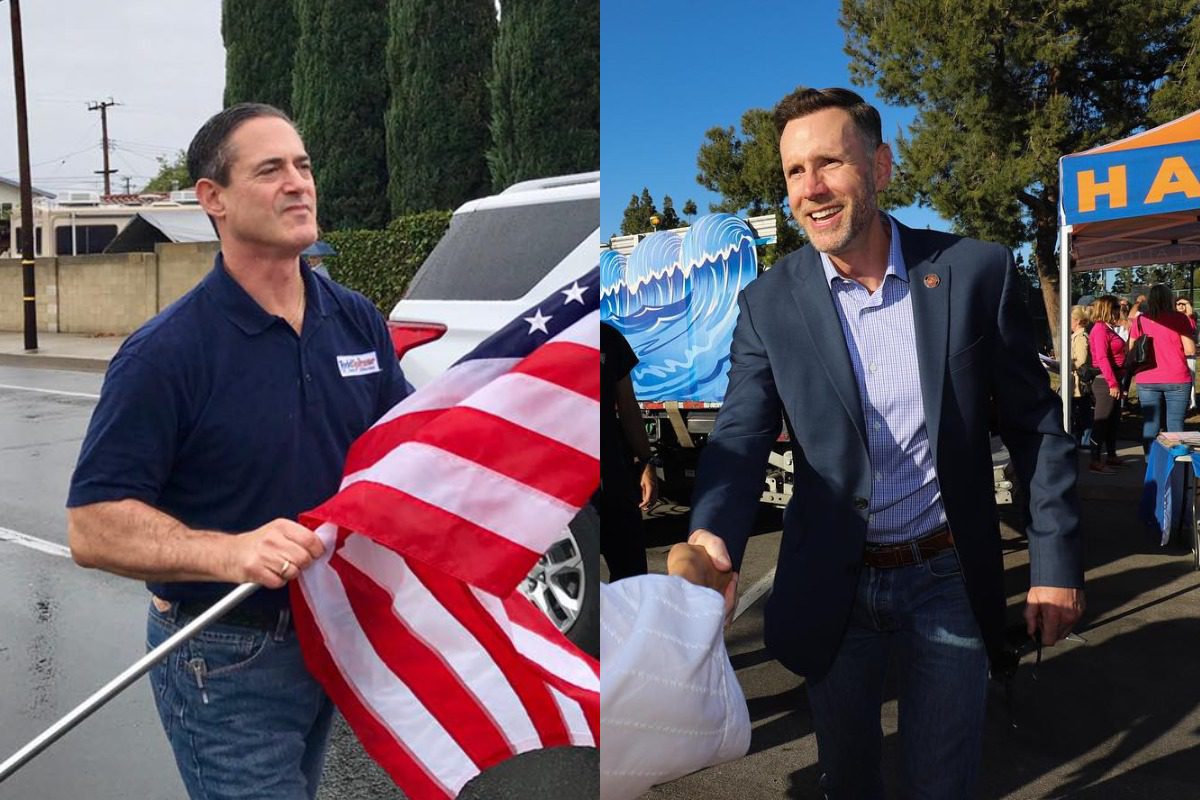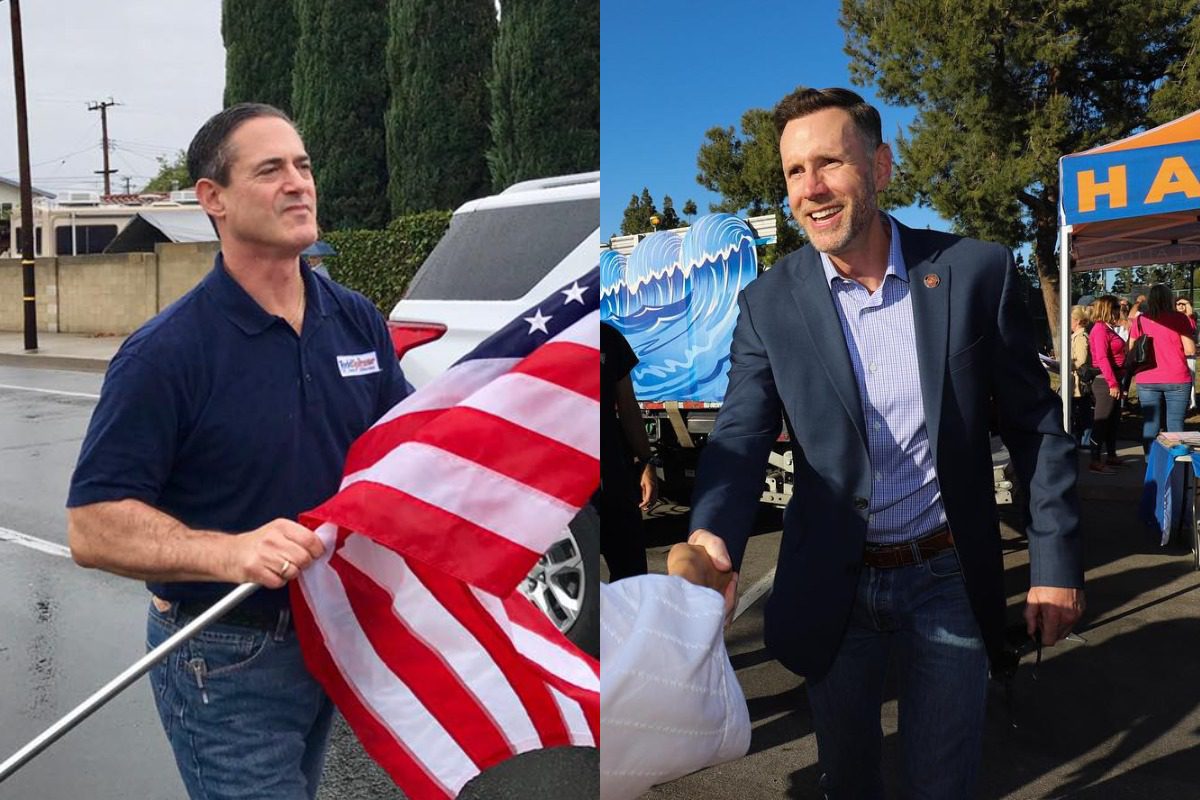Ducking Racism Scandal, Orange County DA Turns to Dog Whistles
This California election pits a prosecutor who is warning of crime outside his county to a challenger who blames him for deflecting from the OC’s own problems.
Piper French | May 24, 2022


The ad, titled “Gotham,” is grim: homeless encampments in Downtown Los Angeles, grainy security camera footage of a robbery, a bullet falling to the ground in slow motion. A news anchor recites crime statistics as an LAPD siren wails in the background and the words LA was destroyed by radical policies flash across the screen.
You’d be forgiven for assuming that this was an ad for a Los Angeles-based candidate. In fact, it was made by Orange County District Attorney Todd Spitzer; the ad goes on to compare Spitzer’s reform-minded opponent, Pete Hardin, to the progressive Los Angeles DA, calling him a “[George] Gascón clone.” This focus has been central to Spitzer’s reelection strategy. From his rhetoric down to his campaign hashtag, #NoLAinOC, Spitzer’s narrative is consistent: he’s the only person who can stop Orange County from transforming into its neighbor to the north.
These references to LA are explicitly about crime and criminal justice policy, but they carry deep racial and economic undertones. Orange County politicians have long juxtaposed OC and LA, says LA Times columnist and former OC Weekly editor-in-chief Gustavo Arellano.“It’s always happened for decades,” he told Bolts, “ever since Orange County got its sense of being ‘Orange County,’ which is to say not urban, not Black, and not poor—and also not liberal.” But demographic changes over the last few decades have made OC more like LA, both racially and politically: the county, once reliably Republican, is moving to the left.
Spitzer has made his campaign a proxy for the culture wars over Black Lives Matter and the national struggle over criminal justice, betting that this will galvanize rightwing stalwarts while seizing on more moderate voters’ fears of crime. Hardin, meanwhile, has focused outreach efforts on immigrant communities and communities of color in Orange County, going door-to-door with allies like the progressive Latinx organization Chispa. To critics like Hardin, Spitzer’s focus on the specter of Los Angeles—and everything that it invokes—is an attempt to distract from the economic and racial injustices and rising crime that undercut Orange County’s image as a pristine coastal paradise. Jodi Balma, a professor of political science at Fullerton College, calls his invocations “dog whistles.”
Spitzer’s rhetoric comes in the wake of a scandal over racist comments the DA made last year. In February, the Voice of OC reported that Spitzer had brought up Black men’s dating practices, and what he described as their tendency to date white women to advance their social standing, in an October meeting where prosecutors were deciding whether to seek the death penalty against a Black male defendant.
Spitzer lost endorsements from a number of fellow California prosecutors, and the Orange County NAACP chapter called for his resignation, tying these statements to a broader pattern of racially disparate treatment documented by a recent study of the DA’s office.
Undeterred, Spitzer is seeking a second term next month against three opponents. Although the election is technically nonpartisan, Spitzer is endorsed by the county Republican Party and the county Democratic Party has endorsed Hardin. Also running are Bryan Chehock, an attorney at the Drug Enforcement Administration, and Mike Jacobs, a retired prosecutor. If no one gets over 50 percent in the June 7 primary, the top two candidates will advance to a November general election.
Spitzer is asking voters to indulge in seductive binaries: OC vs. LA, “woke” vs. law and order, us vs. them. But the election is also testing which vision of Orange County will win out: the old ‘Orange County’ that defines itself in opposition to liberal, diverse urbanity or the new Orange County, an increasingly multicultural place of shifting identities and affiliations where old-school dog whistles may no longer resonate.
—
Spitzer cultivates a bombastic public presence, frequently appearing on Fox News, where he excoriates “woke” DAs like Gascón and San Francisco’s Chesa Boudin. “Todd Spitzer will slice you open if you try to home in on his camera time,” said Balma.
Behind the camera, Spitzer’s tenure as DA has been marked by internal discord—and, occasionally, scandal. In addition to the death penalty hearing comments, he promoted a prosecutor he allegedly knew to be a “pervert,” who was later accused of multiple instances of sexual harassment towards female subordinates—and who happened to be the best man at Spitzer’s wedding.
His office is rife with retaliatory internal investigations, inappropriate remarks about race, and poor treatment of crime victims, according to a recent BuzzFeed News investigation that interviewed 11 of his current and former employees. These improprieties have, at times, affected who the office chooses to prosecute—as in the case of Grant Robicheaux, a Newport Beach surgeon and reality TV star accused of conspiring with his girlfriend to drug and sexually assault local women; Spitzer dropped all charges after inheriting the case from his predecessor.
Spitzer’s time as DA is fairly consistent with his public face as a tough-on-crime prosecutor. He continues to consider the death penalty despite California’s moratorium on capital punishment, and charges minors as adults despite indicating when he took office that he wished to end the practice. The ACLU of Northern California recently released a report finding that the Orange County DA’s office charges Black people at a much higher rate, and is less likely to offer Black defendants diversion; the report used data from Spitzer’s predecessor’s time in office because Spitzer refused to turn over data from his own tenure, but the report remarks that “all available evidence suggests that the office’s policies and practices have not shifted substantially” under Spitzer.
Spitzer responded to the report with his signature deflection, calling it “the ACLU’s playbook for the failed policies of Los Angeles and San Francisco.”
Spitzer’s communications director initially indicated that Spitzer would answer questions for this article, then said the DA didn’t have time after Bolts sent a list of queries. When Bolts followed up about the campaign’s reliance on contrasts with Los Angeles, the spokesperson said in an email that Spitzer “is specifically talking about pro criminal policies in Los Angeles and nothing else.”
To Spitzer’s critics, his constant denigration of criminal justice reformers is undercut by the fact his district is experiencing rising crime despite being helmed by a DA who styles himself as tough-on-crime. Homicides and aggravated assaults have increased in Orange County, as they have elsewhere in the state, and hate crimes and property crime are also on the rise locally; and a recent attempted mass shooting at a Taiwanese American church has crystallized fears about gun violence and racist attacks.
“I think conservative voters and liberal voters alike are ready to have a conversation about how we address the underlying drivers of crime instead of just playing whack-a-mole,” Hardin said, which “creates an endless cycle of crime and homelessness and violence.”
Spitzer is “sending young adults to prison, he’s done nothing about police violence and excessive force,” said Santa Ana council member Johnathan Hernandez, who supports Hardin. “He has not made Orange County safer. His punitive approach to justice isn’t working.”
Hernandez suggested that Spitzer’s demonization of LA is consistent with his dismissive attitude towards communities that don’t live up to the white, wealthy, suburban promise of ‘Orange County’—which extends even to communities within OC. “If he were so concerned about what’s happening in our community, he’d come to our neighborhood,’ he said. “He’d talk to the people, he’d knock on their doors.”
“These moms are impacted by those types of policies,” Hernandez added. “You see it through their heartbreak and anguish when their kids are torn apart from them, and they’re thrown to the prison system for not going to school or for driving with a broken taillight… Nobody here is born a criminal, but it is a narrative that we are struggling to move away from when we’re constantly hyper policed and not properly resourced.”
—
Hardin, a former federal prosecutor who worked for a brief time as a deputy DA in Orange County, is running on a platform of “modernization”: if elected, he pledges to forswear the death penalty, stop charging minors as adults in most cases, and expand eligibility for diversion in cases that involve addiction, homelessness, and mental illness. But he is also focused on ending corruption and bringing “integrity and accountability and transparency” to the DA’s office, which he stressed are nonpartisan values. His own shot across the bow was the release of a 244-page document of opposition research on Spitzer that starts with an explicit content warning. And he has tried to reach conservative voters as well, touting his background as a Marine and prosecutor, though he conceded that endorsements in this race have fallen pretty cleanly along party lines.
Leery of Spitzer’s relentless comparisons, Hardin has tried to distance himself from Gascón: in conversation, he avoided associations with the ‘progressive prosecutor’ movement. “Spitzer conflates me with Gascón even though we are significantly different, and then argues against Gascón instead of arguing against my policies,” Hardin told Bolts. He noted that he diverges with the Los Angeles DA on sentencing enhancements and the presence of deputy DAs at parole hearings, both of which Gascón forbade in his department; and a blanket ban on charging minors as adults, a policy that Gascón has only just reversed after criticism. “Philosophically, I’m opposed to blanket policies in the criminal justice system,” Hardin said.
Hardin’s moderation is carefully calibrated to the county he’s running in. Orange County, once a bastion of Reagan-era conservatism, has become more and more liberal over the years as its immigrant communities have grown, and longtime Republican voters find themselves ill-fitting in Donald Trump’s GOP, Balma told Bolts. In 2016, with Trump leading the Republican ticket, Hillary Clinton became the first Democratic presidential candidate to carry Orange County since FDR did in 1936; two years later, Gavin Newsom flipped the county in a governor’s race. These days, many groups like VietRISE, Resilience Orange County, and Chispa are working to organize communities of color across Orange County around progressive policies.
Hernandez grew up in Santa Ana in the 1990s, in the Chicano and Latino neighborhood Artesia Pilar. Back then, his family and friends never had the sense that the political system cared about them. “We have gotten so used to not having a seat at the table,” Hernandez told Bolts. Today, he said, that’s finally starting to change—but there’s a long way to go.
“Cities like Santa Ana,” Hernandez added, “we’re just being asked to be treated equally. And to see us for the hope that people see every day in our city—not through the lens of despair and danger that our current DA sees our city.”


